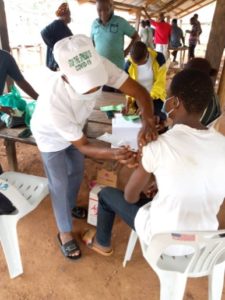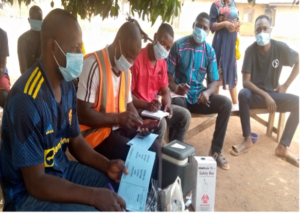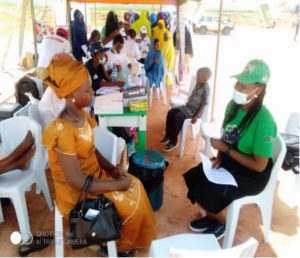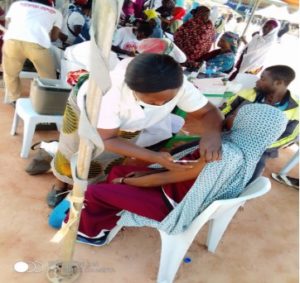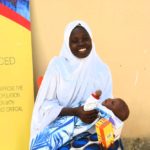Providing Safety from COVID-19 to Cameroon Refugees.
Today is World Refugee Day and we affirm that “Whoever. Wherever. Whenever. Everyone has the right to seek safety”.
Besides, physical safety, refugees also need to be protected from infectious diseases like COVID-19. In this blog, we will present the support that the US Department of State Bureau for Population, Refugees and Migration (BPRM) has provided to Cameroon Refugees in Nigeria to protect them from COVID-19.
Since the onset of the Cameroon crisis, approximately 76,000 registered Cameroon refugees have sought refuge in Nigeria, residing mainly in four states – Akwa-Ibom, Cross River, Benue, and Taraba. These refugees are residing either in formal or informal settlements in host communities in very hard to reach and under-served communities in these states. Besides being in hard-to-reach communities, refugees are also likely to be socially unreachable due to weak integration into the host communities.
According to UNHCR, Cameroonian refugees in Nigeria face major challenges in accessing health care and may be at higher risk for COVID-19 because they reside in areas where it is difficult to gain access to prevention measures like hand hygiene and enforced physical distancing. The hard to reach/under-served areas where they reside also lack health facilities, skilled health care workers, supplies, and equipment for COVID-19 prevention and mitigation interventions including COVID-19 vaccines.
The US Department of State Bureau for Population, Refugee and Migration (BPRM) is responding to the Cameroon refugee situation through the COVID-19 prevention and mitigation for Cameroon refugees and vulnerable populations in Nigeria (COV-PREP) Project which is implemented by FHI 360. The project is implemented in 18 communities that span across seven Local Government Areas (LGAs) in Cross River and Taraba states. These LGAs are; Akamkpa, Boki, Obanliku and Ogoja LGAs in Cross River and; Sardauna, Takum and Kurmi in Taraba State
The goal of the COV-PREP project is to strengthen capacity of host communities, health facilities and health workers to prevent and respond to COVID-19 among Cameroonian refugees and strengthen LGA capacity to prevent, prepare for and respond to future small-and large-scale disease outbreaks. The objectives of the project are to improve the availability of and access to COVID-19 prevention, mitigation, diagnosis, and treatment services for Cameroon refugees in target LGAs in Cross River and Taraba States, improve the capacity of the state and local government health authorities and health care workers to prepare, prevent and respond to outbreaks and to strengthen community-based surveillance for COVID-19 and epidemic-prone diseases at the point of entry. One of the key interventions of this project is to support the Government of Nigeria to reach Cameroon Refugees in the project LGAs with COVID-19 vaccinations.
The COV-PREP interventions seek to improve the reach and uptake of COVID-19 vaccines among Cameroon refugees and vulnerable host communities commenced with advocacy to the National Primary Healthcare Development Agency and the Cross River and Taraba State Primary Healthcare Development Agencies. This successful advocacy led to the design of COVID-19 vaccination surge plans for the host communities where these refugees are residing. (The surge plans outlined the specific parts of the communities where the refugees were residing, and the resources needed to reach them with COVID-19 vaccinations.)
This was followed by formation of COVID-19 vaccination surge teams. Each of the 18 communities were covered by two vaccination teams and each is made up of two social mobilizers, two vaccinators and one records officer. in which one of the social mobilizers must be a refugee. FHI 360 provided stipends to these teams to cover their transportation, meals, and communication when they visit these communities to provide COVID-19 vaccination to Cameroon refugees and host community members.
Vaccination activities commence with social mobilization. This was delivered by the social mobilizers who are responsible for raising awareness about COVID-19 vaccines and providing information on how the COVID-19 vaccine works and the dosage. They also addressed common myths, misconception and misinformation about COVID-19 and the COVID-19 vaccines. These social mobilizers engaged with refugee leaders and the relevant stakeholders to address the potential contributory factors for vaccine hesitancy through participatory, culturally sensitive, and social network approaches delivered in the refugees’ local languages.
The social mobilization was closely followed by targeted COVID-19 vaccination campaigns to improve access and uptake of COVID-19. Campaigns will target health and social service providers, elderly and/or living with co-morbidities that predispose them to severe COVID-19 disease. FHI 360 supported the NPHCDA and SPHCDA to set up data management systems to monitor and manage vaccine uptake among refugees and host communities, using NPHCDA’s COVID-19 vaccination cards, registers, and tally sheets.
The COVID-19 vaccination intervention commenced in February 2022 has successfully reached 3,544 Cameroon refugees with COVID-19 vaccines. One of the key lessons learned from this intervention is that a strong community engagement reduces vaccine hesitancy to the barest minimum. The main challenges being experienced is stock-out of vaccines. The next step for the COV-PREP is to support the State Primary Healthcare Development Agencies to sustain access to COVID-19 vaccines in the project locations.


